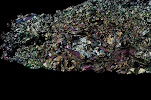Friday, 30 October 2009
Attending AGU in December
Thursday, 29 October 2009
Extending the parameters of my “1000 words a day” challenge
One of the things I’m doing here, in addition to my experiments, is taking classes in the local language. I’m dutifully doing my homework each day before it is due, but I’ve not been making much additional effort towards actually learning this language. All of my colleagues are so fluent in English that I can speak at my normal high rate of speed, so I don’t *need* to learn the language to do my job. Likewise when at the market it is easy enough to use the phrase I’ve memorized for “half kilo” and point, and then look at the numbers printed on the cash register to work out how much to pay. Again, I don’t *require* the local language to live my life here. Yet, it would be nice.
Therefore, I have expanded my “1000 words a day” to now be either read (at least) 1000 words of geologic literature in my own language, or spend 20 to 30 minutes translating something. One of my favourite books as a child was Anne of Green Gables
Wednesday, 28 October 2009
Background learning has meant a reduction in posting
Ah, writing; it is such an easy way to communicate with people—simply enter the words into a keyboard at a time of your own choosing, and your audience will have the option to read it later, at a time of their choosing. No need to arrange a face-to-face meeting with them to share your information. No need to repeat yourself over and over—one typing session can communicate to hundreds of people, should you wish it to (and, at times, even if you don’t so wish, so it is always best to be careful what you commit to the written form, lest your words be shared in a venue unexpected).
So, what science have I been doing while I was busy not writing (or, in a couple of cases, not taking the photos to accompany the writing)? So far it has been simply learning the mechanics of setting up my experiments. #1 has been run, #2 is in progress, and #3 is approaching ready to go. Next week, I am told, we will look at the results of #1 in the microprobe and see what there is to see. It will be interesting to compare the two samples. My experiments are being run with about 5% H2O and a small piece of graphite sealed into the gold capsules with the powder. When sealing the capsules it is important to do the welding with the capsule bottom surrounded by water to keep it cool so that the welding process doesn’t boil off the water before it is sealed. I failed to do this with the first capsule I filled. Likewise, I am not certain that I actually managed to get the capsule completely welded shut. If there is a small opening in the capsule it is possible for the water to boil out of the capsule early on in the experiment, and so not be available for chemical reactions.
Given the huge difference in texture between the two samples which comprised my first experiments, this may have happened for one of them. Apparently when water is present in the capsules the result is an amount of porosity in between the grains of powder, despite the high pressure of the experiment, so the end product is soft and easily torn out of the capsule after the run, if one isn’t very careful in the polishing process. However, when water isn’t present the grains of powder are pushed more closely together, and the new minerals have a chance to interlock as they grow, resulting in a much more coherent sample. One of my two samples polished up without a tendency for powder to be plucked out of it, so it is likely that this one operated under “dry” or nearly dry conditions. The other required much more care as it was soft. It was necessary to coat it with additional epoxy before the final polish to keep it from being lost. It will be interesting to compare the results of the two samples. Are there any hydrous minerals at all in the one we suspect was “dry”? I will have to wait till early next week to learn the answer to this question.



